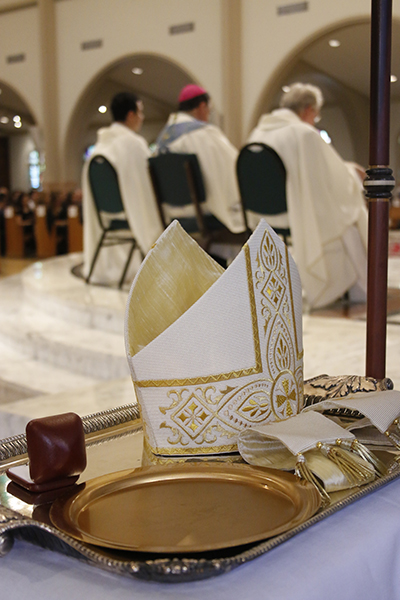By Rogelio Zelada - Office of Lay Ministry
A great uneasiness invades the community of Jerusalem. Hellenist Christians justifiably protest after noticing how members of the community who should be providing daily meals to Greek-born widows are not treating them well.
At first, the widows — the image of absolute social helplessness — went every day to the temple in Jerusalem to receive food — “table service” — funded by the daily and weekly collections in the synagogues. However, with the growing number of Christians, rejection from the Jewish authorities also increased, and as Christian widows were denied entrance to the dining rooms of the temple, the Church had to take on the task of feeding them daily.
At this point, the first community faced the challenge of an unusual coexistence. It had welcomed in its midst converted Jews of Greek culture and language, Samaritans, and finally pagans of every origin.
To solve the situation of caring for the widows, the apostles, with the help of the Holy Spirit, establish a new ministry of deacons and establish procedures to be followed. From then on, each time a new need arises, the Church will institute the proper and needed ministries so the work of the Gospel can move forward.

Photographer: ANA RODRIGUEZ-SOTO | FC
The symbols of the office of bishop: ring, miter and crosier.
The apostles go out into the world armed with the Word and begin to establish communities. They do not stay in them for long, just enough to give them structure, organization, and especially, to establish the process of conversion to a Christian life in Jesus Christ. Thus, a network of small ecclesial communities sows the message of Christ in the world, and many missionaries are sent forward to promote evangelization. The apostles consolidate these communities by visiting or sending them letters, which are like a gospel of conduct to deal with the difficulties of growing in the faith. Soon, there will be new ministries in the body of Christ to lead the people of God.
Paul speaks of this diversity of charisms in the First Letter to the Corinthians. He places the apostles in first place as witnesses to the Resurrection, pillars of faith and assurance of the revealed message. They have placed prophets at the forefront of the churches they have been founding, because they are best qualified to guide new believers, to interpret the Word of Christ, and to preside over the Eucharist. In the community, there will also be evangelists, catechists who will illuminate the path of catechumens with the help of teachers or doctors, authentic Christian scribes who will delve into Scripture, line by line, looking for any reference to Christ not only in the prophets, but in the entire Old Testament.
As communities expand, the apostles institute a new ministry responsible for caring for them in their stead: the bishops. The chosen name explains its function, as the Greek word “episkopos” literally means “supervisor,” i.e., “which looks over.” The bishops will initially have the task of monitoring how communities are functioning, visiting, correcting deviations, admonishing, teaching and encouraging them. The Church also has Christians of mature faith, who have the longest experience in faith and spiritual growth: the elders, “presbyters,” genuine consultants, persons of influence in which believers can trust and consult.
This initial structure will give way to another, especially with the progressive disappearance of the apostolic community. By the end of the first century, the bishops have established themselves as heirs of the apostolic mission. They will be the successors of the apostles and assume the roles of the prophets. The bishop will be the great preacher of the faith, and his preaching should be considered instructions on faith and action by the faithful. He will be the great teacher, the guardian of Christian doctrine, the first catechist of his diocese. He will be entrusted with the great mission of sanctifying, governing and shepherding the Christian flock, of stimulating and promoting effective and dynamic ways and methods of evangelization, with great emphasis on the pastoral care of the poor, and on consolidation and union, along with his ministry, of the entire diocesan family.
By the first century, the Church gradually reorganizes and structures itself into three hierarchical orders:
- The bishop (the supervisor), who guarantees the unity in faith. His ministry unites the Church. He is responsible for the liturgical celebration and the missionary and evangelizing activity in his diocese.
- The presbyter (the elder), whose function is to assist the government of the diocese, providing his knowledge and expertise. New bishops could be elected from among them.
- The deacon (the server), in charge of the affairs of charity and of community management, always under the authority of the bishop, for whom he is an immediate assistant.
To this day, with different nuances throughout history, the Church of Christ has preserved this structure and has enriched it so it could be more effective in its service and mission.
The Second Vatican Council includes a beautiful text about the mission and pastoral life of the bishops. Lumen Gentium says the bishop “is sent by the Father to govern his family, must keep before his eyes the example of the Good Shepherd, who came not to be ministered unto but to minister, and to lay down his life for his sheep… But the faithful must cling to their bishop, as the Church does to Christ, and Jesus Christ to the Father, so that all may be of one mind through unity, and abound to the glory of God.”
Zelada is associate director for Hispanic formation of the archdiocesan Office of Lay Ministry. He serves on the U.S. bishops’ Subcommittee for Hispanic Liturgy, writes a monthly column for La Voz Católica and is a regular contributor to the archdiocese’s Let’s Talk blog.

